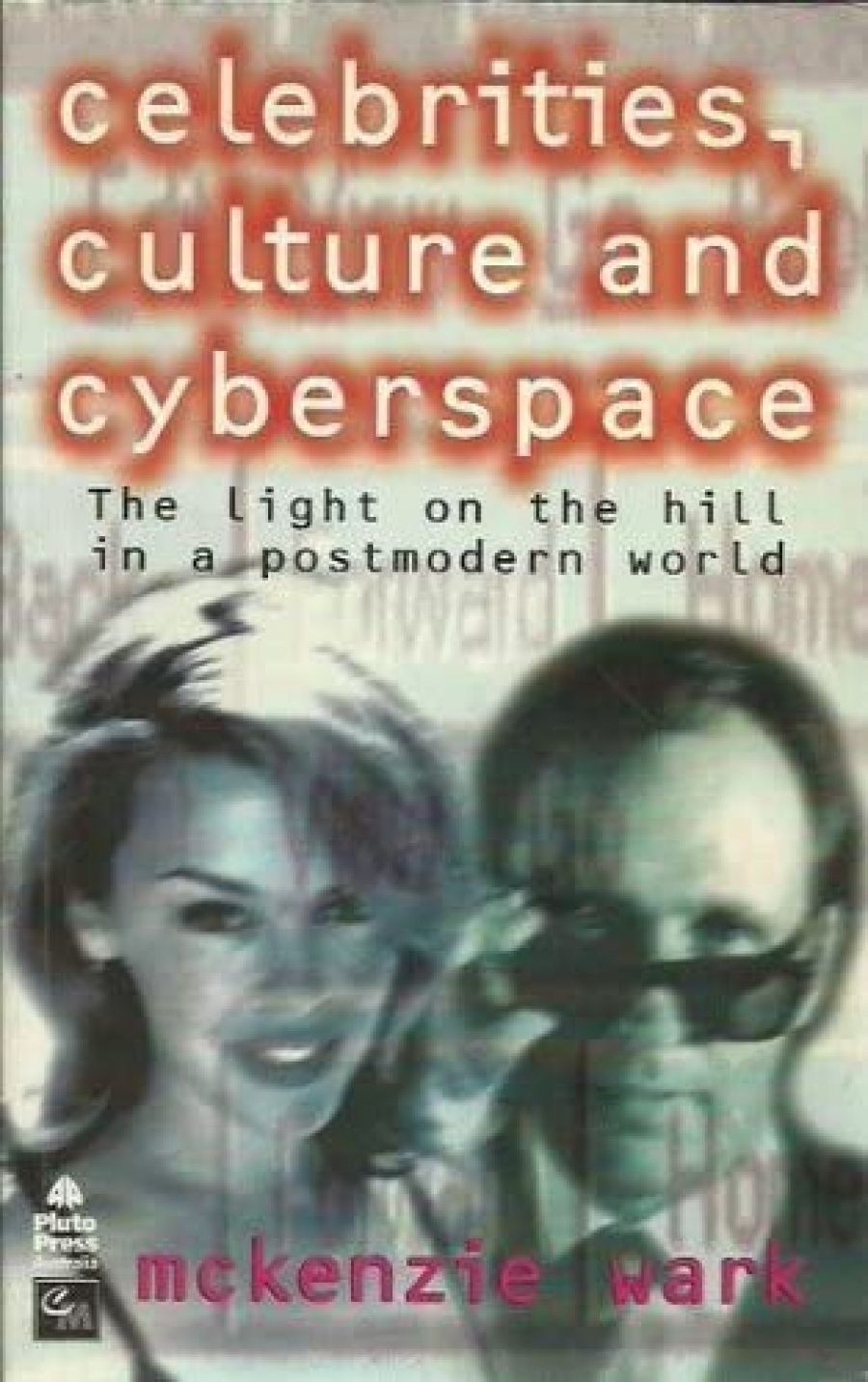
- Free Article: No
- Contents Category: Society
- Review Article: Yes
- Online Only: No
- Custom Highlight Text:
McKenzie Wark had the good fortune to ensconce himself in media studies just when those who once would have busied themselves with Stendhal or John Tranter began to envy his terrain. And his various journalistic gigs, notably his column for The Australian Higher Education Supplement, give him the advantage over other academics of being able to cobble together a book every year or two. Or, as he puts it, ‘Celebrities, Culture and Cyberspace is a book that was written in its own peculiar way, as a series of experiments with fitting events and ideas together, conducted in public, through a wide variety of print and electronic media.’
- Book 1 Title: Celebrities, Culture and Cyberspace
- Book 1 Subtitle: The light on the hill in a postmodern world
- Book 1 Biblio: Pluto Press, $24.95 pb, 372 pp
Of course, everyone’s thinking meanders with direction, and this book affectingly records the process, but Wark does feel compelled to bind together the four things on his mind with a bland thesis: that Hawke and Keating’s Australia prefigured the dynamics of contemporary social democratic governments overseas, and that the ALP must relearn the ability to negotiate cyberspace it had then if it is to assemble electoral majorities once again. Yes, cyberspace then, because (geeks beware!) this book is not erotic futurology, but has the historical discernment to see the monitor in the TV screen, the mouse in the hand that turns the page.
The light on the hill (Wark so helpfully cites Jill Roe’s suggestion that the phrase comes from Matthew 5.14) emerges as broad access, educationally and in terms of hardware, to information technology, when Wark finally discusses policy via the manifestos of Lindsay Tanner and Mark Latham. Most of the time his ALP affiliation comes across as technicolour barracking. The light on the Millennium Dome.
Wark’s party spirit extends to intellectual matter. Welcome Catharine Lumby, whose thesis of popular participation in social debates through celebrities he incorporates. Welcome Mark Davis, whose sloppy diatribe on generationalism, Gang-Land, he describes as ‘a breath of fresh air’. (Wark wants to call those intellectual goons who will never stop putting down youth the Burblers, which suggests more Rex Hunt than Andrew Riemer to me.)
Welcome gang. They even start writing the book for him, as one chapter becomes a barely filtered email forum on Countdown and The Brady Bunch with Christos ‘I was attracted to Greg’ Tsiolkas and Darren ‘I wanted to fuck Marsha’ Tofts joining in, among others. I’m glad Wark gives space to the concerns of my generation which the mainstream media suppresses. If the generational thing projects a valid economic problem onto flimflam, Wark’s quasi-autobiographical obsession with the suburban takes a similar turn. It’s probably true that Howard’s (and Hanson’s) electoral success reflects some outer-suburban areas identifying with the rural hinterland rather than with metropolitan centres. Projected into the cultural sphere as some chasm between the urban and suburban, this can come across as flashy snobbery, particularly as Wark seems keen to identify such evils as listening to Mahler or going to Chekhov productions as suburban. Whereas in Kings Cross:
I whisper something in CD’s ear as she stands, long and lean beside me in her black Betsy Johnson dress. Then I talk to Khym about her cookbook, which I tell her I am using all the time. She is making web sites for Microsoft now. Milissa and Neil swap publishing gossip. I meet an architect from East Timor called Paolo who is designing a new nightclub. I tell him I want to renovate and ask for his email address.
What a monstrous, suburban, archetypally ABC fantasy Wildside was to get the place wrong. Nothing disturbs the quiet of Sleepy Hollow.
Of course a book as diffuse as Celebrities, Culture and Cyberspace will have its moments. Its analyses of recent celebrity related events, from Kylie Minogue’s reinventions of herself, to the alleged pornographic video of Mimi Macpherson, from Natalie Imbruglia’s haircut to Peter Garrett’s, achieve the difficult feat of saying something about the recent past even as it begins to recede from memory. The account of the Labor years as a pas de deux with mass culture sounds right, and the conclusion that we need a cybersavvy party is true enough.


Comments powered by CComment